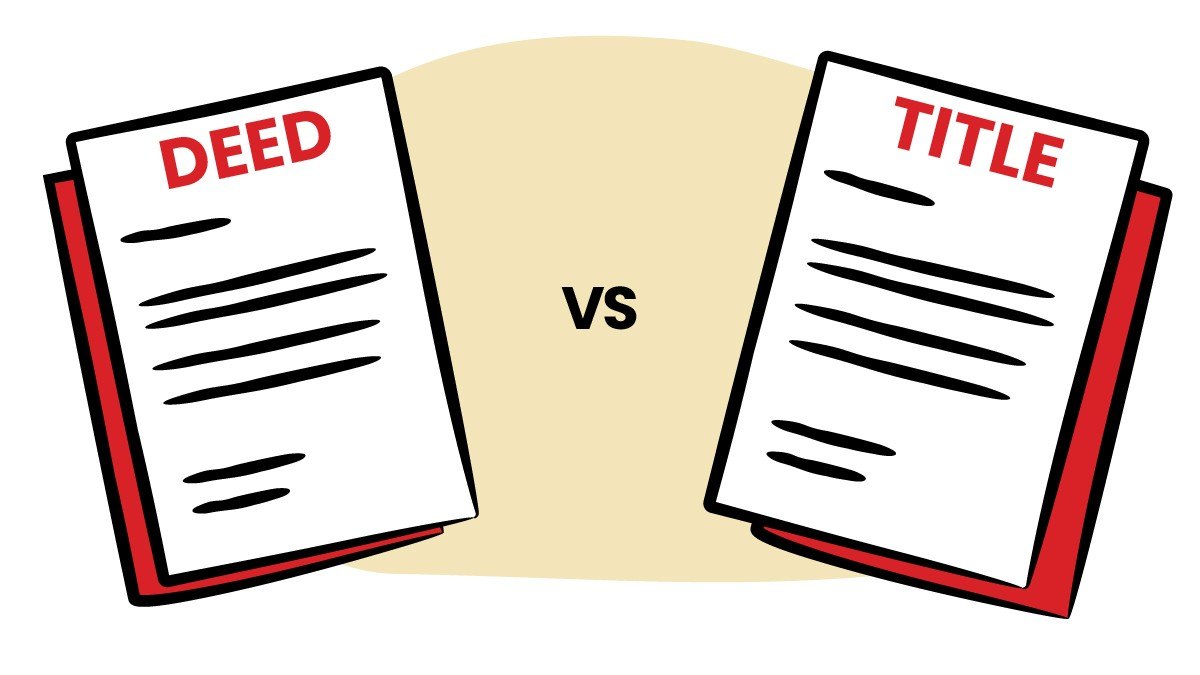What is the Difference Between a Title and Deed?

Title and deed are terms that you are likely to come across when dealing with the issue of property purchasing or selling. A lot of people think that they are the same but it is not. One should learn the what is the difference between a title and deed to make wise choices concerning property dealings, in case you are interested in purchasing or house for sale in rajkot or another Indian metropolis.
This article will explain both terms, why they matter in real estate, and what they mean, so you can handle your next property transaction with ease.
What Is a Property Title?
Basically, a property title is about ownership. Prospective property owners obtain a title to something so that they have the right to occupy and use, give, rent, or transferto another person.
In the Indian context, the title indicates property ownership, however, the title will not necessarily indicate clear and undisputed ownership due to prior deals, inheritance issues or disputes about ownership.
Before he sells a property, a prospective buyer will be interested in the fact that he is selling a title free of encumbrances, otherwise it can be a big problem when one wants to sell the property or in seeking a loan in future.
Key Features of a Property Title:
Legal Grantee of Title: Title suggests that the person is the owner of the property.
Possession/Control: The title entrusts the user with the power to use and take possession and control of the property.
Transferability: Title can be transferred from one person to another through a legal process.
In case you are looking at buying a house for sale in Rajkot, one of the first things to verify is a clear title and marketable title.
What Is a Deed?
A deed is a legal term for conveying ownership (title) of land and property by one party to the other. In India, the deed must be registered with the Sub-Registrar Office in your neighborhood, subject to the Registration Act, 1908.
The legal recognition that the seller has bestowed the buyer with all the property will be through the deed. So, if you're buying a house for sale in Rajkot, the deed is the paper trail that shows the transaction took place.
Types of Deeds in India
Sale Deed: The most common deed in real estate is used when someone sells a property to a buyer.
Gift Deed: Used when someone transfers property without money changing hands often between family members.
Lease Deed: Used for rental agreements that last over 11 months.
Mortgage Deed: Normally occurring when someone is pledged to the loan.
Each of these deeds serve a different purpose but all help to transfer and manage ownership rights.
What Is the Difference Between a Title and Deed?
Now let us address the question, what is the difference between a title and deed?
Along with understanding what is the difference between a title and deed will assist you with understanding you're not only purchasing property, but receiving all the rights that legally go along with it
Importance in Real Estate Transactions
When selling property, understanding the difference between a title and deed is important to establish legal ownership while keeping everything above board and protecting buyers’ interests. Here's how each item is an important piece of the puzzle:
1. Legal Ownership Confirmation
The seller should also look into ensuring that it contains a clear and marketable title before the sale, in order to enable the buyer to understand whether there is any outstanding dispute, debt (mortgage, loans, etc), or limitation to the property. Buyers must do the same check beforehand.
2. Transfer of Ownership
The sale deed is the legal document that transfers ownership from the seller to the buyer. Indian law doesn't recognize the transfer even if someone has paid, without a valid registered deed.
3. Protects Against Fraud
As the cases of property fraud in India, especially in cities like Delhi, Mumbai and Rajkot or in cases of property being sold out by indirect sale, the recording of the deed and checking title, it is possible to avoid purchasing the property which is being disputed or is being transferred.
4. Loan Eligibility
Banks and other lenders check the title before they okay a home loan. If you plan to finance your purchase, you must have a clean title and a registered deed. For example, if you want to buy or house for sale in Rajkot, banks will first check if the property is legally sound through a detailed review process.
5. Future Sale and Transfer
Recording a deed and having a clear title will give the buyer the power to sell the property, rent it, or transfer the property later with confidence that he or she will not have a problem on legal grounds. It also makes inheritance easier for your heirs.
To wrap up, understanding what is the difference between a title and deed isn't just book knowledge—it has a direct impact on your ability to buy, own, and sell property and in India.
How to Check Property Title in India
To check a property title in India, follow these steps:
Look at Sale Deed History: Make sure there's a complete chain of ownership by checking past registered sale deeds.
The Encumbrance Certificate (EC): The EC is obtained from the Sub-Registrar's Office and indicates no loans or dues exist on the property.
Review the land records: Most states now have web portals (e.g., AnyRor in Gujarat) that can be used to review the seller's name, classification of property, and mutation status.
Request a Title Search Report: Employ a legal expert to examine ownership history, look for disputes, and confirm title clarity.
Verify Mutation Records: Mutation makes sure property taxes are in the current owner's name.
Check Tax Receipts & Utility Bills: Make sure there are no unpaid dues and the seller's name matches ownership documents.
Check Approved Building Plans: For built properties, make sure the municipality has given the green light to avoid the risk of tearing down structures.
Common Problems with Titles and Deeds
Fake Documents: Always check if the deed is real.
Unregistered Transfers: A deed that's not registered has no legal standing.
Inheritance Disputes: Legal heirs are able to raise the claims in case the ownership is not transferred.
In case you thought of a high-value property like a house for sale in Rajkot, then you have to conduct research to avoid legal complications.
Steps to Register a Deed in India
This is a simple overview of what to do to record a deed to property:
Stamp Duty Payment: You will have to pay a correct stamp duty that depends on the value of the property.
Visit Sub-Registrar Office: The buyer seller, and witnesses must show up in person.
Verification and Biometrics: The registrar checks who everyone is and looks over the papers.
Receive Registered Copy: When it's all done, you'll get a copy with official stamps.
This sign-up process makes the change in ownership legal.
Tips for Buyers
Make sure you know what is the difference between a title and deed.
You don't want to end up with a paper that looks real but has no legal power.
Don't agree to cash-only deals. Ask for proper paperwork.
Ask the seller to provide the latest tax receipts and EC to check for legal issues.
To verify ownership of a house for sale in Rajkot, use Gujarat's digital land record systems (like AnyROR).
Legal Solutions for Title or Deed Problems
If you find issues with the title or deed after buying:
Start a civil case to nullify a fake deed.
Report to the police if you suspect forgery.
Contact the revenue department to fix land records.
Knowing the difference between a title and deed gives you the legal know-how to act .
Conclusion
A "title" grants you the right to own property, while a "deed" serves as proof that this right has been transferred to you. Both are very important in any real estate transaction. If you're considering a house for sale in Rajkot or any other city in India, knowing these two concepts—and understanding what is a Title Deed of Property—will protect your property purchase as well as provide you peace of mind.
Always check ownership and make sure all deeds are registered. Knowing what is the difference between a title and deed might be essential to buying property and in India.
FAQs
Q1. Is a title the same as a deed in real estate?
Ans: No. A title refers to the legal ownership and rights to the property, while a deed is a legal document used to transfer that ownership from one party to another.
Q2. Can you own property without a registered deed?
Ans: No. Ownership is not legally recognized until a registered deed is executed. Even if payment is made, without registration, the transaction is not valid under Indian law.
Q3. What is a clear title and why is it important?
Ans: A clear title means the property has no disputes, loans, claims, or legal encumbrances. It ensures safe buying, easier loan approvals, and hassle-free resale.
Q4. Who issues the property deed in India?
Ans: The deed is drafted by legal authorities or advocates and must be registered at the local Sub-Registrar Office under the Registration Act, 1908.
Q5. What documents should I check before buying property in Rajkot or other cities?
Ans: You should verify:
Latest Sale Deed
Encumbrance Certificate (EC)
Property tax receipts
Approved building plan
Mutation records
Title search report
Land record details on portals like AnyROR (for Gujarat)
Q6. Can a deed be cancelled or challenged later?
Ans: Yes. Deeds can be legally challenged in cases of fraud, forged signatures, incorrect land details, or conflicting inheritance claims.
Q7. Does having a deed automatically mean the title is clear?
Ans: No. A registered deed proves transfer, but the title could still have disputes from past ownership issues. Always conduct a title search before buying.
Q8. What happens during deed registration in India?
Ans: The buyer and seller appear before the Sub-Registrar, submit documents, pay stamp duty, sign, verify identity, and receive a registered copy with official seals.
Q9. Are digital or scanned copies of deeds legally valid?
Ans: Digital copies are useful for recordkeeping, but only the registered physical/legal document at the Sub-Registrar has full legal validity.
Q10. Who is responsible for verifying title before sale—buyer or seller?
Ans: Both. The seller must ensure a marketable title, while the buyer must conduct due diligence to confirm there are no financial or legal claims.
Q11. Can a title be transferred without a sale (e.g., to family members)?
Ans: Yes, through a Gift Deed, Relinquishment Deed, or partition deed, but it must still be registered to be legally valid.
Read More: Top Benefits of Commercial Property Investment in 2025








ADD COMMENT